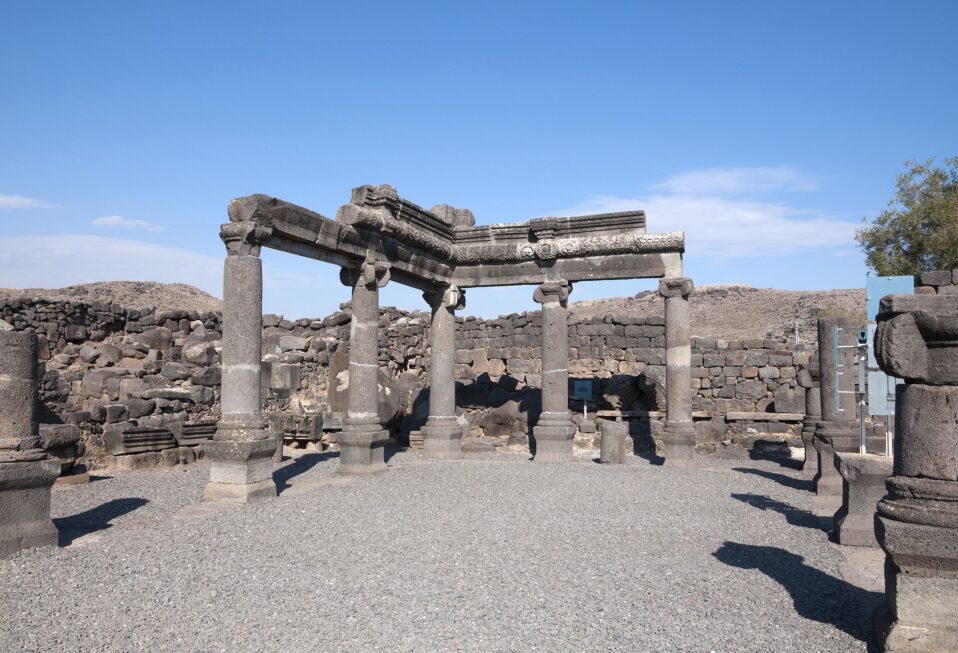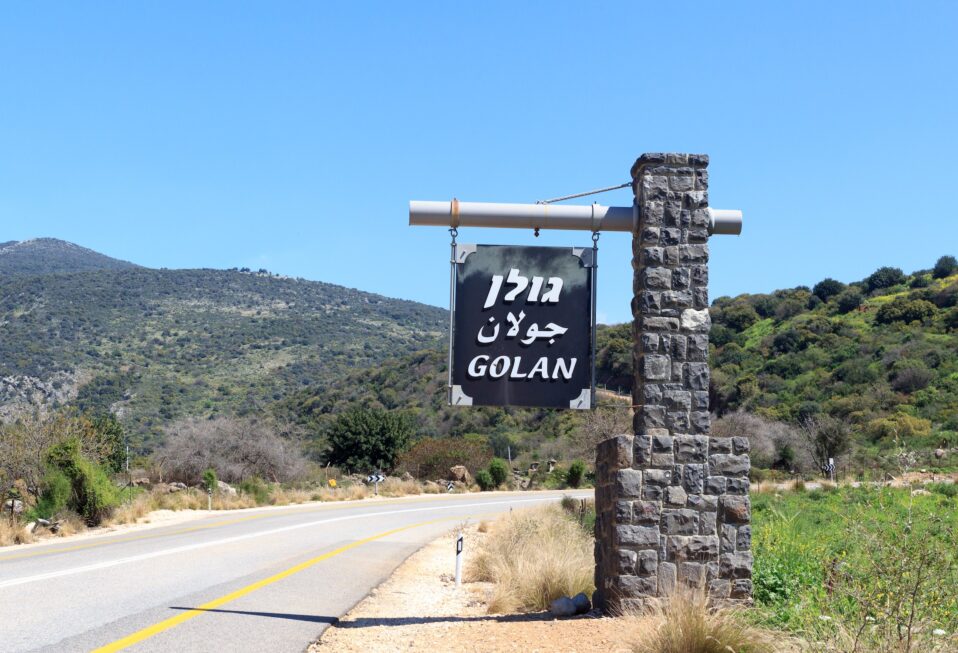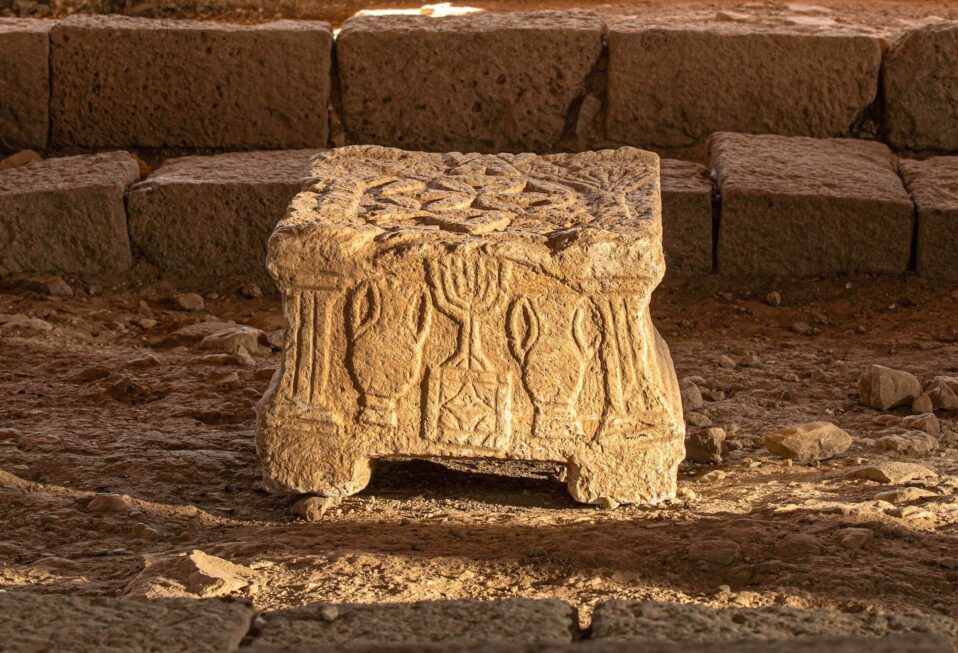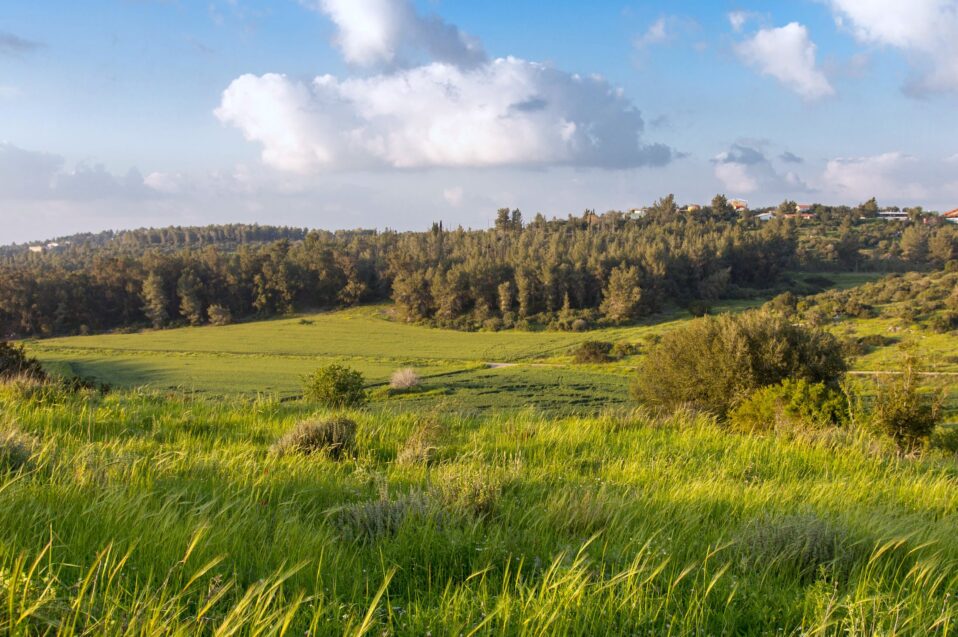By Arlene Bridges Samuels
Traveling north to Israel’s Golan Heights is an adventuresome journey of hairpin turns, vineyards, and vistas of the snow-capped 9,000-foot Mount Hermon. Yet despite an ancient history wrapped in boundless beauty, ominous warning signs about uncleared minefields from the 1967 Six-Day War still dot the landscape—and reflect ongoing controversy.
I have often visited the Golan Heights before, during, and after serving on the staff of the American Israel Public Affairs Committee and the International Christian Embassy Jerusalem USA. On some visits, my tour groups might see two faces of the Golan. As we rode in four-wheelers on paved and dirt roads—giving us up-close looks at the fields, wildflowers, and trees—we marveled at its beauty. But sitting on the Israel/Syria border during Syria’s horrific civil war, my groups learned firsthand from expert military briefings that were punctuated by bombs in the background. One year, following the 2018 Christian Media Summit, I navigated hairpin turns on the Jordanian side of the Golan. Gripping the steering wheel in the evening shadows, I—along with my good friend Robin—finally arrived after dark! Relieved, we each took a deep breath, stepped out of the car, and shared a Shabbat with new friends and a delicious meal. They made the harrowing drive worthwhile!
Falling in love with the scenic Golan Heights and its history is easy to do. So, when Israel made headlines about the Golan late last month—on December 26, 2021—I embraced it as good news, since the government’s plans will enhance Israel’s security and sovereignty. Prime Minister Naftali Bennett and his cabinet announced their goal to double the population of the Golan Heights over the next five years. The Knesset approved a $317 million plan to build 7,300 homes. Fittingly, they met in a small village, Mevo Hama (“Gateway”). Located a mile from the Sea of Galilee, the kibbutz is considered the southernmost location in the Golan.
A predictable media outcry ensued over Israel’s decision, as if Israel was the problem. In its regrettable habit of excluding key facts and context, the media conveniently ignored the 19 years of Syrian aggression against Israel before the Jewish nation captured the Golan Heights in the Six-Day War. In a December 29, 2021, article by Hadar Sela at the Committee for Accuracy in Middle East Reporting and Analysis (CAMERA), she writes, “During the years between 1949 and 1967, a generation of children who came to be known as the ‘shelters generation’ grew up in Gadot and many other nearby villages and kibbutzim and it was this difficult reality which led a delegation from the area to press the Prime Minister of the time, Levi Eshkol, to capture the Golan Heights during the last day and a half of the Six-Day War.”
Also omitted by the mainstream media was Israel’s significant offer right after the war: to return the Golan in exchange for peace. The now-famous “Three No’s” entered the Arab vernacular when they met in September 1967 in Khartoum, Sudan. The Arab League announced, “No peace with Israel, No recognition of Israel, and No negotiations with Israel.”
Fortunately, the Abraham Accords have changed many minds about those “no’s.” Years have passed since that utterance. Today, there are 53,000 Golan Heights residents—both Jews and Arabs—who will benefit from 2,000 newly created jobs, more agricultural initiatives, and additional housing to accommodate the increase in population. Living peaceably in the area are 27,000 Jews, 24,000 Druze, and 2,000 Alawite Muslims. Also planned in the new venture are transportation systems along with educational and healthcare facilities.
In his remarks, Prime Minister Bennett said this move was prompted by the Trump administration’s decision in 2019 to recognize Israel’s sovereignty over the Golan. The United Nations, media, and others condemned Trump’s stance, claiming that Israel was violating international law. However, many international law experts, such as Professor Eugene Kontorovich of George Mason University’s Antonin Scalia School of Law, disagree. In testimony before Congress in 2018 he asserted, “Whatever the current status of an absolute prohibition on territorial change resulting from war, there was certainly no such blanket prohibition in 1967, when the territory came under Israel control. At the time, international law only prohibited acquisition of force in illegal or aggressive war.” And, as he further explained, such changes would not apply retroactively.
Aside from controversies over international law, Israel’s security is paramount. From the towering Golan Heights, the Israelis can monitor Syrian movements and Iran’s efforts at transporting weapons into Syria. History proves that neither Syria nor Iran is interested in a peace agreement with Israel. Iranian troops are entrenched in Syria right over the Syrian edge of the Golan. Syria is the Iranian Imams’ proxy for weapons storage depots on land and at the port of Latakia. Israel’s Golan buildup not only benefits its citizens, but it sends a clear message that Israel is not retreating. Israel’s population is increasing. Statistics show that 25,000 Jews made Aliyah to Israel last year, up 30% since 2020. Hopefully, many families and businesses will choose the beautiful Golan for their new homes, jobs, and lifestyles.
Both Deuteronomy 4:43 and Joshua 21:27 show God’s land deed in the Golan, then called the biblical city of Golan in Bashan. God assigned it to the tribe of Manasseh (Joshua 13:29-31). Ancient and modern battles have ensued in and around the Golan, with borders changing and rearranging with the rise and fall of nations and armies. Since 1967, when Israel reclaimed its Golan heritage, archaeologists have uncovered substantial proof of ancient Jewish life. They have discovered around 30 synagogues in the region. The menorah, Israel’s national symbol, is engraved into numerous centuries-old stones and boulders of all sizes.
I learned about the synagogues, their locations, and architecture in a fascinating book of text and photos entitled Ancient Synagogues of the Golan by Dafna and Eran Meir. In 2019, Israel’s Government Press Office (GPO) hosted its last in-person Christian Media Summit prior to COVID-19. They planned a fantastic day in the Golan for us and also gifted us with this informative hardcover book.
The day included a delicious Israeli lunch at the newly named Trump Village, followed by an inspiring ceremony under a large tent as the sun slipped behind the hills. Leaders representing three faiths signed a proclamation of peace and unity for the Golan, including Druze Sheik Salim Abu Salach, Rabbi Aharon Eisental, Chief Rabbi of Hispin Village, and David Parsons, international spokesman for International Christian Embassy of Jerusalem. One hundred and twenty media professionals from all over the world witnessed the signing.
The ceremony was inscribed into our hearts with a prayer written and spoken especially for the ceremony by Hadassah Schwartz, Senior Coordinator of International Religious Journalism for Israel’s Government Press Office:
“Our Father in heaven, Rock and Redeemer of Israel and Jerusalem, bless the Golan Heights and those who seek its peace and send blessings and success to all their work. Envelop us in Your peace, bestow eternal happiness to the inhabitants of our land. Remove war and bloodshed from the world and bequeath a great and wondrous peace from heaven. ‘Nation shall not lift up sword against nation; neither shall they learn war anymore’” [Isaiah 2:4].
“Sanctify the earth with blessed rain and bestow upon us rich produce from above. Manifest Yourself in bold splendor before the eyes of all inhabitants of Your world. As it is written [Isaiah 21:2], ‘The Lord of Hosts has a day in store for all the proud and lofty; for all that are exalted, and they will be humbled; for all the tall and lofty Cedars of Lebanon and all the oaks of Bashan.’ May everyone endowed with a soul affirm that the Lord God of Israel is king, and His dominion is absolute. Amen.”
Please join CBN Israel in prayer this week for the nation and people of Israel:
- Pray Hadassah’s prayer not only for the Golan Heights but for Israel, the United States, the Middle East, and the rest of the world.
- Pray for Israel’s ongoing vigilance of its northern border near Syria and Lebanon.
- Pray for an end to the terror plots of Israel’s enemies—particularly in Syria, Lebanon, Iran, and among Palestinian militants.
- Pray for the Christian community to remain steadfast in prayer and action on behalf of Israel and the worldwide Jewish community.
- Pray for CBN Israel to be more effective than ever at reaching millions worldwide with the true story of Israel and the Jewish people.
Arlene Bridges Samuels pioneered Christian outreach for the American Israel Public Affairs Committee (AIPAC). After she served nine years on AIPAC’s staff, International Christian Embassy Jerusalem USA engaged her as Outreach Director part-time for their project, American Christian Leaders for Israel. Arlene is now an author at The Blogs-Times of Israel and has traveled to Israel 25 times. She co-edited The Auschwitz Album Revisited by Artist Pat Mercer Hutchens and sits on the board of Violins of Hope South Carolina. Arlene has attended Israel’s Government Press Office Christian Media Summit three times and hosts her devotionals, The Eclectic Evangelical, on her website at ArleneBridgesSamuels.com.














